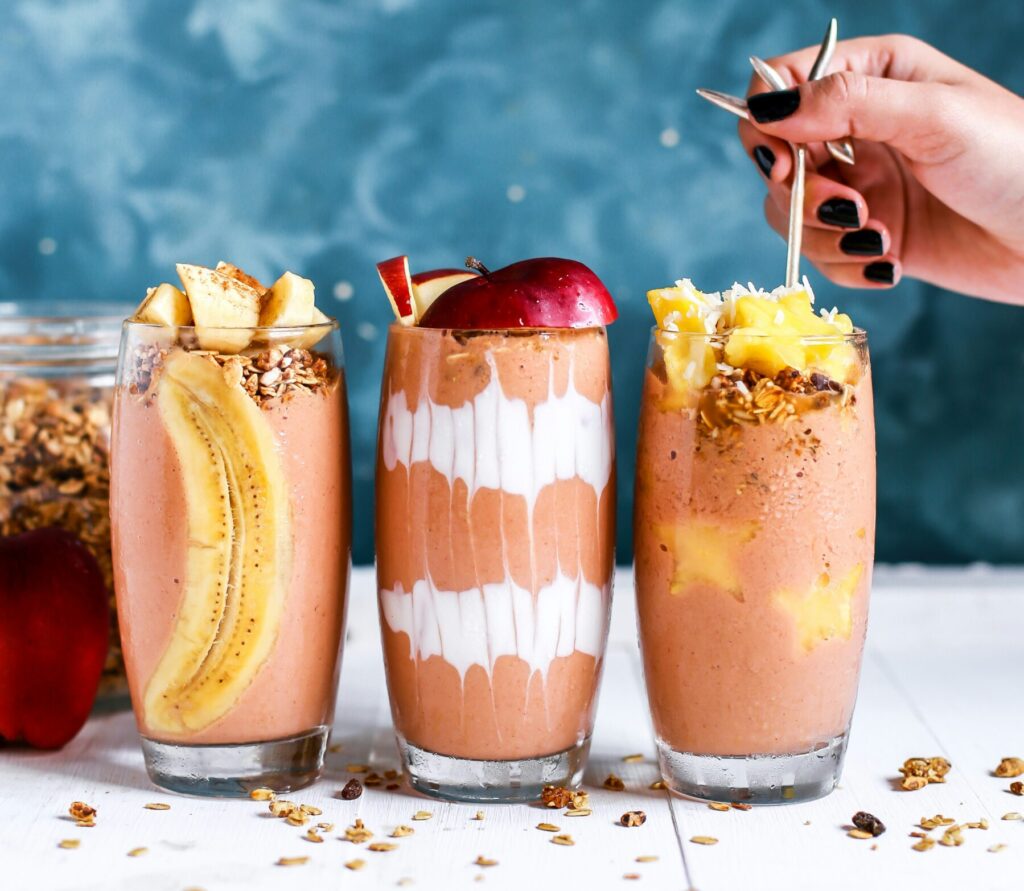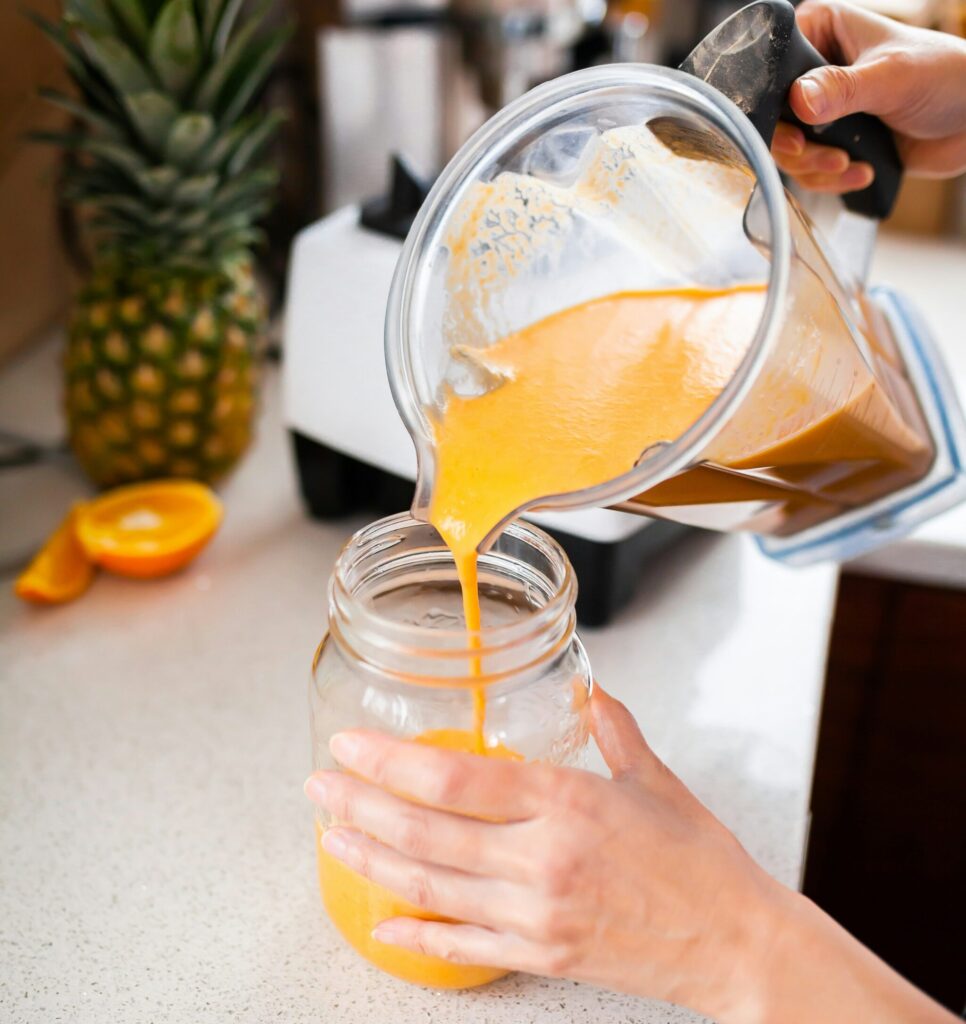In this article, we’re diving deep into the world of drinking smoothies while pregnant and how beneficial they can be for mom and baby.
Between the cravings, the nausea, and the whole “growing a tiny human from scratch” thing, eating well during pregnancy can feel like a full-time job. But it’s important, very important!
Here you’ll learn whether they’re safe, what science says about their benefits, the essential nutrients to aim for specifically during pregnancy, and what ingredients to avoid – because not everything that blends should be consumed.
We’ll also cover smart smoothie tips for busy moms-to-be and answer a few juicy FAQs.
Spoiler alert: yes, smoothies can be your best friend during pregnancy if done right.
Are You Even Allowed to Be Drinking Smoothies While Pregnant?
The short answer is yes—unless you’re tossing raw eggs and unpasteurized milk into the mix.
Drinking smoothies while pregnant is generally considered safe and beneficial as long as you use clean, pregnancy-safe ingredients.
According to the American Pregnancy Association, it is a great way to meet your nutritional needs when you’re short on time, low on energy, or have little appetite.
Smoothies are also customizable, gentle on the stomach, super hydrating, and quick to prepare and cleanup afterwards. It’s the ultimate win for pregnant woman.

The Real Benefits of Drinking Smoothies While Pregnant
So, what’s the big deal with smoothies? They’re not just trendy drinks for yoga moms. There’s actual science behind why they’re great during pregnancy.
Let’s take a closer look at some of them:
1. Nutrient Delivery System
Pregnancy increases your need for essential nutrients like folate, iron, calcium, and an omega-3 compound called DHA.
Thus, Smoothies can deliver those nutrients efficiently and effectively, especially when solid meals feel like a battle and the desire to chew food is at an all-time low.
And, because these health drinks are already blended – aka broken down into a liquid – they are much easier to absorb into the body to deliver all the needed nutrients.
You can pack things like the following into a smoothie blend:
- Leafy greens (high in folate and iron)
- Berries (antioxidants)
- Fortified plant milks (calcium and vitamin D)
- Nut butters or seeds (protein and healthy fats)
- Protein Powder (amino acids – the bodies building blocks)
As Harvard’s School of Public Health notes, whole food smoothies are a great way to improve your nutrient intake, especially for those struggling with morning sickness or food fatigue.
2. Smoothies Can Soothe Nausea
Drinking smoothies while pregnant is especially helpful in the first trimester when nausea begins to hit hard.
Thus, cold and delicious drinks can feel more palatable than solid food meals during times like that.
Adding things like some ginger, bananas, or mint can ease your stomach without making you gag. And because smoothies are blended, very little effort goes into digestion.
All of this assists in relieving nausea while still enjoying something delicious and nutritious for you, and of course, for developing baby.

3. Hydration Hero
Amniotic fluid doesn’t just magically appear. It requires good hydration!
Smoothies, especially those made with water, coconut water, or healthy milks, help you stay hydrated, which is essential for your baby’s development.
Wait—What Is Amniotic Fluid, Anyway?
Think of amniotic fluid as your baby’s first and safest swimming pool.
It’s the clear, slightly yellowish liquid that surrounds your baby in the womb and it’s super important.
It cushions your little one from bumps, keeps the temperature just right, helps with movement (so those tiny arms and legs can practice their ninja kicks), and even supports lung and digestive development as your baby swallows and “breathes”.
Early on, it’s mostly made of water from your body. Later, it includes baby’s urine—yep, perfectly normal in there.
Therefore, staying hydrated helps your body keep a healthy amniotic fluid level.
Yet another reason drinking smoothies while pregnant is a win for both of you.
4. Supports Baby’s Growth & Development
During pregnancy, your baby’s brain, organs, and nervous system are developing at a rapid pace and they need the right nutrients to do it well.
Nutrients like choline, DHA (an omega-3 fatty acid), protein, and fiber amongst many others play essential roles in this growth.
what exactly can these nutrients do?
- Choline supports brain development and helps prevent neural tube defects.
- DHA is vital for the development of the brain and eyes.
- Protein supports the formation of tissues and muscles.
- Fiber aids in healthy digestion and helps regulate blood sugar levels, which is important for both mom and baby.
In fact, research from the National Institutes of Health (NIH) emphasizes the importance of these nutrients in supporting not only fetal brain development but also long-term cognitive health.
Many of these nutrients can be easily included in smoothies.
Ingredients like leafy greens, Greek yogurt, nut butters, chia seeds, flaxseed, and even fortified plant-based milks as mentioned before, can all contribute to a nutrient-rich drink that supports your baby’s healthy development.
And there’s great news: all of these can be added into smoothies.
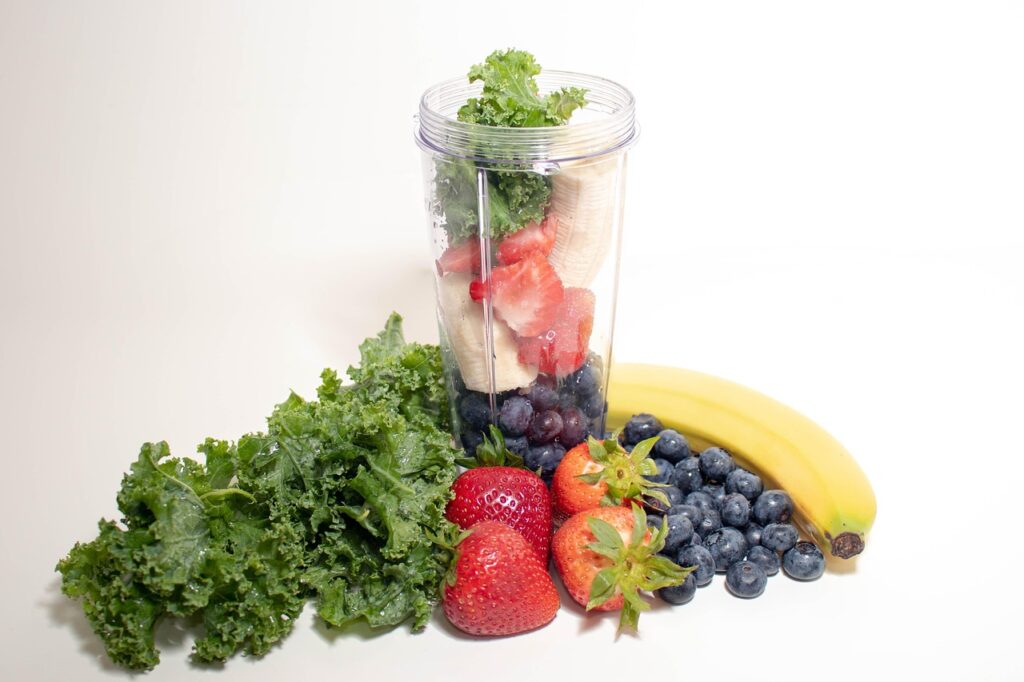
Key Nutrients to Include When Drinking Smoothies While Pregnant
When you’re pregnant, your nutritional needs drastically increase to support both your health and your baby’s development.
Below are some of the most important nutrients to prioritize in your pregnancy smoothies, along with why they matter:
- Folate (Vitamin B9) – Folate plays a critical role in the development of the neural tube, which becomes your baby’s brain and spinal cord.
Adequate folate intake in early pregnancy helps prevent neural tube defects like spina bifida. Some natural sources include leafy greens, citrus fruits, and avocados.
- Iron – Your body needs significantly more iron during pregnancy to support the increased blood volume and to help transport oxygen to your baby.
Iron-rich ingredients like spinach, kale, beetroot, or pumpkin puree can be blended into smoothies to boost overall iron levels.
- Calcium – Calcium is essential for the development of your baby’s bones, teeth, heart, and muscles, and it also protects your own bone density.
Yogurt, fortified plant-based milks, and chia seeds are excellent smoothie-friendly sources amongst many others.
- Vitamin C – This antioxidant not only supports your immune system but also enhances iron absorption from plant-based sources.
This is easy to include in smoothies by adding fruits like strawberries, oranges, mango, and kiwi.
- Protein – This is necessary for the growth of fetal tissue, including the brain, as well as supporting your uterus and breast tissue. In addition, the amino acids in protein are involved in all sorts of growth and developement activities.
Ingredients like Greek yogurt, nut butters, tofu, and protein powders designed for pregnancy are great smoothie add-ins.
- Fiber – It helps maintain healthy digestion and prevent constipation, which is a common pregnancy complaint. Fiber also traps toxins assisting in their removal from the body.
Things like fruits, vegetables, oats, flaxseed, and chia seeds are fiber-rich and smoothie compatible.
In the end, you don’t need a PhD in nutrition to get these into your smoothie. All that it takes is just a little planning and a decently stocked fridge and pantry.
Overall, with thoughtful ingredient choices smoothies can be a reliable and enjoyable way to meet many of your nutritional needs during pregnancy without requiring complicated meal prep.
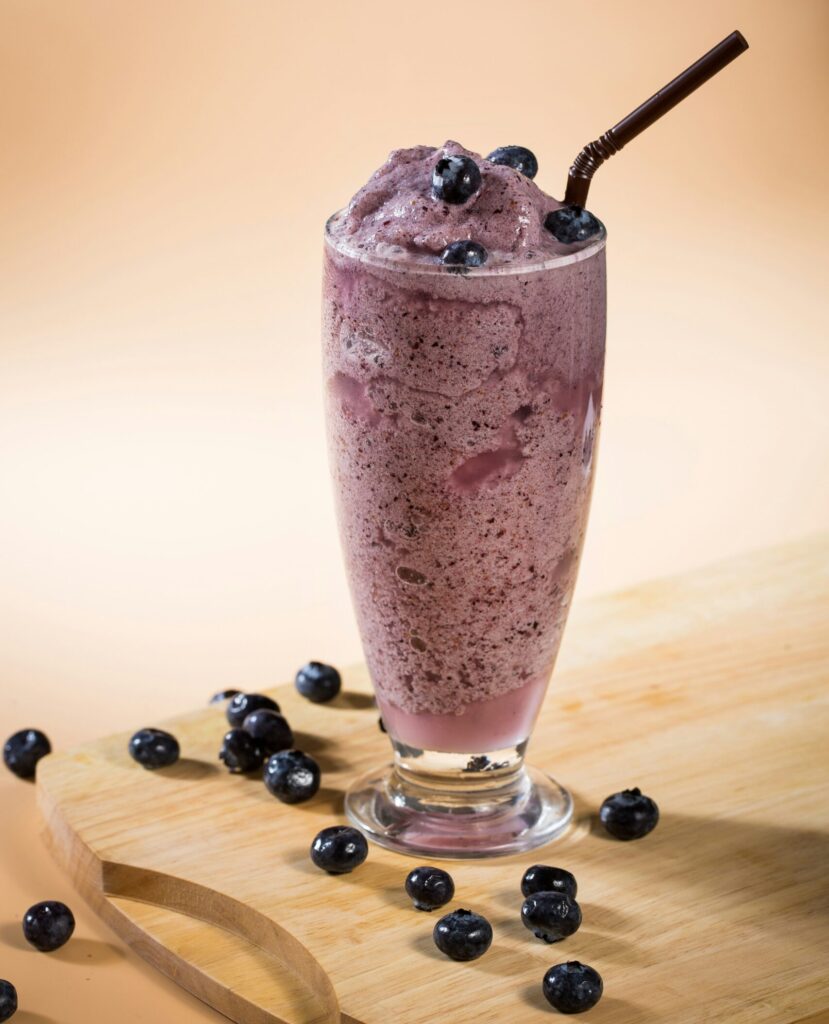
What to Avoid When Drinking Smoothies While Pregnant
Okay, so not all smoothies are clean and innocent. Some are straight-up nutritional traps dressed in fruit. Here’s what to watch out for:
- Unpasteurized dairy or juices – These can carry harmful bacteria.
- Raw eggs – Also a risk for harmful bacteria that can make you sick.
- High-sugar smoothies – A sugar bomb can spike your blood sugar and rob the body of nutrients.
- Exotic powders or herbs – Always check with your healthcare provider before using certain exotic herbal remedies..
- Allergen foods – Avoid foods that you get an allergic reaction to. This is often unique to you. You would’nt want to pass this on to baby as you get bad reactions.
- Food Intolerances – These exist mostly in your gut. Foods that don’t sit well or give you negative reactions in the digestive tract such as excessive gas, stomach cramps, severe heart burn, and that don’t digest well should generally be avoided.
During pregnancy it’s best to make it as pleasant and easy as possible. So, by avoiding potentially risky ingredients, it will make your experience much more pleasant.
Tips for Smoothie Success During Pregnancy
So, now that you’re sold on the smoothie life (hopefully)—let’s make it more practical.
Here are some great tips to keep in mind:
- Batch prep ingredients and freeze them in small packs for busy mornings.
- Use a straw if textures are turning you off.
- Add healthy fats like avocados, nut butters, coconut items or flaxseed to keep you full.
- Sneak in greens like spinach, kale, mint, beet greens or micro greens—it’s tasteless but full of iron.
- Label your bags with the nutrients you’re targeting. For example: “Iron booster!”
- The right blender makes all the difference. Use something high quality and powerful.
Now, you don’t have to drink one every day, but drinking smoothies while pregnant a few times a week can make a big impact. Of course, daily would be better, especially if you love smoothies.
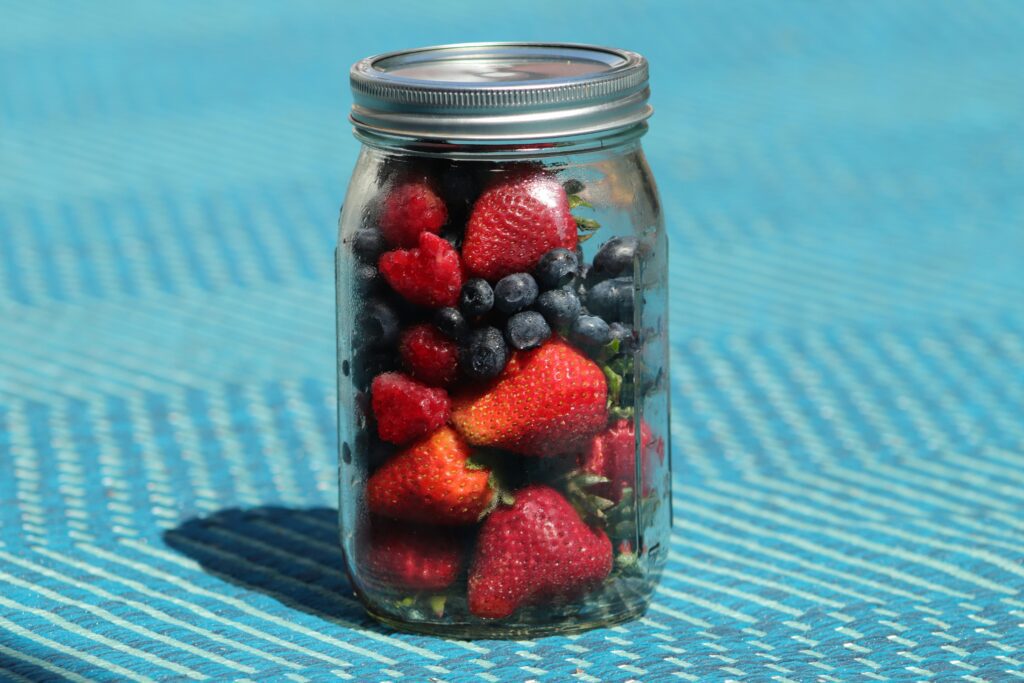
FAQs About Drinking Smoothies While Pregnant
Q: Can I drink smoothies every day while pregnant?
Yes! if you’re using safe, balanced ingredients. Just watch the sugar and portion sizes.
Q: Are green smoothies safe during pregnancy?
Absolutely. Spinach, kale, and other leafy greens are fantastic sources of folate and iron. Just wash them well!
Q: Can smoothies help with pregnancy constipation?
Definitely. Adding fiber-rich ingredients like berries, pears, chia seeds, avocado, oats, ground flaxseeds and more will work to keep things regular.
Final Verdict
Drinking smoothies while pregnant isn’t just helpful, it’s practically a secret weapon.
They’re customizable, nutrient-rich, and honestly, sometimes the only thing that won’t make you gag by 10 a.m.
So, whether you’re battling morning sickness, struggling to eat enough, or just want an easy way to feed your tiny future smoothie-lover, a well-made smoothie can go a long way.
There can only be benefits to adding smoothies into your diet during pregnancy. So, if you haven’t incorporated them into your diet, why not start now and see for yourself what a difference they can make.
In conclusion, you’ll be giving your baby – and yourself – the best for both your bodies.



